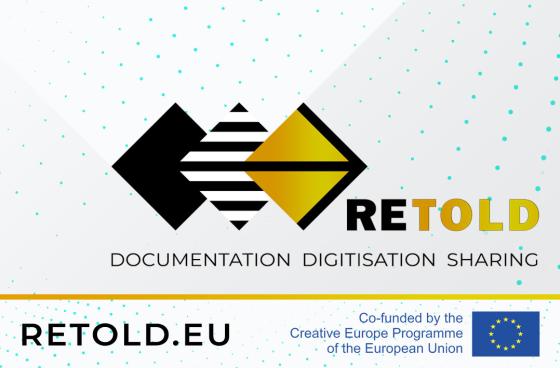RETOLD: Update on the 2nd year of the project

In the second year of the RETOLD project (2022), a large scope of activities took place.
Following the vlogging seminar back in May 2021, RETOLD partners have been testing their new skills and creating RETOLD related videos, either about the project or documenting activities and events taking place.
One of the products of the RETOLD project is a small presentation / exhibition at our three museum partners, explaining the project and what we want to achieve. In October 2021 we decided to make it in three steps, adding each year another chapter. The exhibitions will consist of banners 100 x 200 cm, in both English and local language. In the first step we produced general banners introducing the partners and the RETOLD project. By March 2022, two banners per partner were made.
With already a year of exploratory research behind us, Nüwa have set themselves a deadline for our first in-person RETOLD meeting in June: to construct a first design prototype for our proposed Digital Archiving and Documentation application, made specifically for use in Open-Air museums. Through UX (User Experience) analysis and user interviews, we had already found out that most existing digital archiving solutions are more suited to “static” collection-based material, while open-air museums deal with the task of ongoing documentation of outdoor exhibits, often over several decades. To ensure an ideation process that is focussed on the potential users of our design, we derived user personas from our interviews - the curator, the student volunteer, the craftsperson, and last (but perhaps not least) the museum director.
And then, in June 2022, after 18 months of working together digitally, we finally were able to meet in person in Barcelona at the beginning of June. Paloma González-Marcén and Clara Masiera Esquerra as well as the rest of the team at the Universitat Autónoma de Barcelona (ES) were our welcoming hosts for the conference. The aim was to introduce the RETOLD project to a wider public of specialists and students as well as to test the prototype. Cordula Hansen from Nüwa had designed a digital prototype based on the paper forms to document reconstructed houses created by Julia Heeb from the Museumsdorf Düppel. We were looking at workflow, practicality, and simplicity.
As part of the RETOLD project’s survey of the state of digitalisation and documentation in European open-air museums, our partners representing Nuwa Digital Media travelled to the Middelaldercentret (DK) for a week of field work and photogrammetry in August 2022. Since the museum is packed with craft demonstrations by staff and guest volunteers, they took the opportunity to try out possible formats for documenting craft activities. Inspired by Dr Julia Heeb’s documentation form for recording reconstructed houses and installations, we designed a video script to prototype a standard format for documenting crafts and activities. Archaeologist and educator Sally Pointer then volunteered to try it out on camera. They were careful not to over-produce the film, but to make sure to have a usable common structure for this type of documentation.
September was when EXARC produced a podcast episode about RETOLD. Julia Heeb is one of the key figures in RETOLD and also works as the exhibition and research manager at the Open-Air Museum, Museumdorf Düppel, in Germany. She was joined by Cordula Hansen, an experienced VR designer and developer at Nüwa Digital Media Content Production Studios, a Dublin-based digital media agency. As well as working in digital design, Cordula has a PhD in art and archaeology, and she is hugely enthusiastic about working to enhance interactions between people and technology in cultural spaces.
On 15 September 2022, the museum partners of the RETOLD project met online to participate in a workshop on short video marking and editing for social media, focussing on what works best for (open-air) museums. EXARC member Eva Götting was lending her expertise in the five-hour workshop and provided background information on statistics, the various types of videos and a general plan for scheduling videos to be successful.
But what about the app? The work in this second RETOLD year focused on the design of a unified database that can accommodate all the data requirements for the project. In November 2022 we had a good discussion with a few CIDOC-CRM specialists. We intend to use that as the base for structuring data. It was thanks to the communication with members of the CIDOC-CRM team that we could understand how model the project needs using the CIDOC-CRM ontology and create an initial draft of the data entities and relations required.
